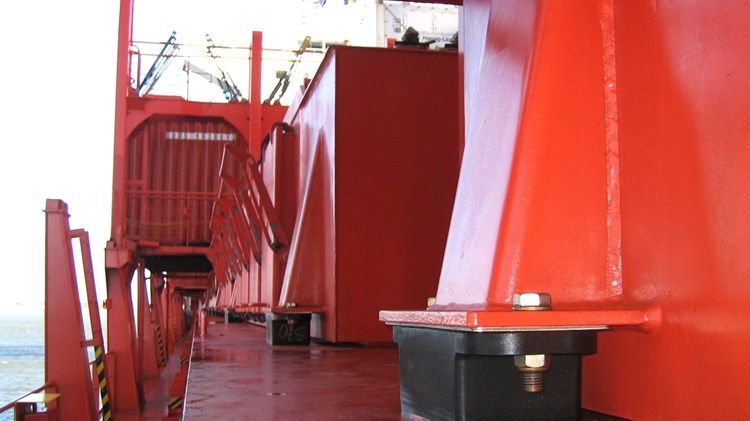Hatch cover load transmission

Worn or incorrect bearing pads compromise ship safety. Decades of experience and continuous development means that MacGregor is able to offer a range of bearing pad options designed to ensure safety and meet every size of vessel and operational need.
Hatch cover bearing pads may be small, but play big part in structural performance. They transfer the weight of the cover, and any cargo it may be carrying, to the ship’s hull while allowing for relative movement between the cover and the hatch coaming caused by hull flexing in a seaway. They must also maintain the correct compression on the hatch cover seal and avoid wearing damage to the coaming/hatch cover interface.
As bearing pads transfer weight, lateral forces are generated and are then transmitted to the ship’s coaming and hatch cover structures. These forces are used in fatigue strength analysis at the newbuilding stage, and subsequently, the structures are designed according to these calculations.
We know that to obtain the required safety margins and to guarantee a trouble-free operational lifetime, hatch cover systems have to be maintained as instructed, and critical spare part components, such as the hatch cover bearing pads, have to be of original design. This is because there can be great variations in sliding and wear properties of different bearing materials, including all composites and designs.
MacGregor bearing pads are manufatured to the highest quality standards and perfectly meet the requirements of a vessel’s hatch cover system, ensuring its structural integrity.
Steelpad and Fixpad
A steel bearing pad is typically designed for use on container vessels less than 1,000 TEU and small general cargo ships and bulk carriers. It is essential that data relating to maximum surface pressure and the hardness difference between the two steel surfaces is taken into account.
Lubripad, Polypad, Unipad and Flexipad
For larger vessels, especially container ships, where greater demands are imposed on the bearing pads and there are increased relative movements and potentially excessive loadings, an arrangement based on low-friction replaceable sliding pads (Lubripad, Polypad or Unipad) or non-sliding flexible replaceable pads (Flexipad) are essential.
Read more from our brochure: